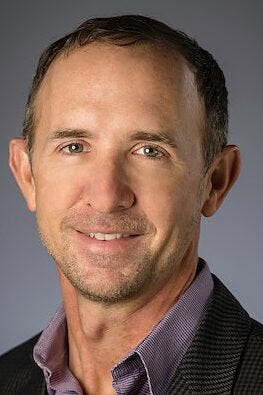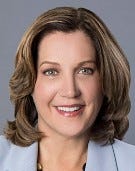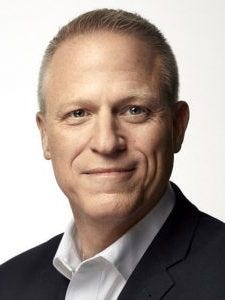Northpoint's Sammy Kinlaw Explains Why Partners Need Financing OptionsNorthpoint's Sammy Kinlaw Explains Why Partners Need Financing Options
Northpoint is carving out a niche to serve credit- and cash-strapped partners and the distributors and vendors that work with them.

Newly appointed Northpoint Commercial Finance vice president of technology sales Sammy Kinlaw says financial creativity and as-a-service consumption models can solve a huge pain point for channel partners.
In a move that drew intrigue from across the channel, the longtime channel leader recently started a role at the commercial finance provider. Kinlaw, who gained a strong reputation in the channel from working at vendors Lexmark and IBM, and most recently distributor TD Synnex, will help Northpoint build a deeper footprint in the indirect technology sales channel.
Kinlaw said his appointment expands upon a footprint Northpoint has been building in the channel for the last year. He described the channel as “underserved” by the commercial finance market. And that’s simply because the financial community has focused on the large and publicly traded companies.
But the proliferation of new vendors and technology has helped draw attention to the channel.
“There are many, many, many new vendors that are small. Many are private equity. Some are publicly traded, but some are not large, and they have niche software and niche security offerings that have gained interest,” Kinlaw said.
Northpoint dipped a foot in the water by turning to some of its existing relationships in the channel. However, Northpoint CEO Dan Radley – to whom Kinlaw reports – saw an opportunity to expand the play. Kinlaw said Northpoint’s initial explorations confirmed that it needed to bring on a leader with deep knowledge and connections in the channel.

Northpoint’s Sammy Kinlaw
Who better for that than Sammy Kinlaw, who has worked in various companies and roles across the IT channel. He most recently led U.S. sales at mega distributor TD Synnex. Before that he led worldwide sales at imaging and printing vendor Lexmark. He also led Lenovo’s North American channel and its SMB segments, and managed IBM’s East Coast VAR business. He left TD Synnex last fall.
Kinlaw’s phone has been ringing off the hook since he took the job. He said he has been working through a long queue of channel partners, distributors and vendors who are kicking the tires on Northpoint’s offerings. And the ubiquity of the interest stems from a mix of macroeconomic and channel-specific trends.
The macroeconomic situation is well-documented. Interest rates sit at their highest in decades. The federal funds rate stands at 5.25-5.5%. One would need to go back to 2001 to match that level. Channel M&A leaders have reported a slowdown in activity as a result. Moreover, financial leaders across the industry are managing cash differently now, Kinlaw said.
“That means they’re tightening expenses. They’re tightening travel; they’re tightening spend; they’re tightening operations. They’re looking for efficiencies and ways in which they can preserve cash. Part of that is normal course of business, which includes flooring, terms and conditions, suppressed billing opportunities,” he said. “All of those things are carrying a heavier weight today than they did 12 months ago, and I know that’s certainly the reason why people are saying, ‘What can Northpoint bring to the table? How’s it different than what we have today?’”
And while interest rates pale in contrast to decades prior – they touched the 20s in the 1980s – a new breed of channel partner now exists. Kinlaw said that in his recent years working in distribution he saw an increasing number of VARs identifying themselves as MSPs and focusing on driving recurring revenue. They’re attempting to make more than 50% of their P&L as recurring revenue, Kinlaw said.
Prioritizing recurring revenue has proven wise for many partners, but the rising expense of debt has drawn out new challenges with …
… the model.
“Think about all the companies that we deal with today that weren’t even in business 23 years ago. You can list thousands, especially when you look at software vendors,” Kinlaw said. “Well, all those companies, and frankly most of those MSPs and most of those next-gen hardware technology providers, all built infrastructure. And they all built P&Ls based on an opex with an assumption that cash is cheap.”
CB Insights interviewed 463 startup leaders about why their businesses failed. Forty-seven percent said they failed because of a lack of financing or investors. The second most common cause was running out of cash (44%).

JS Group’s Janet Schijns
“No matter what the rates are, if you don’t get the capital, you’re going to fail,” JS Group CEO Janet Schijns told Channel Futures.
Schijns added that tightening of available cash hurts the channel as a whole. For example, she said more than 30% of partners did not run marketing campaigns for new customers.
“If the trend continues that you cut customer-facing things in order to afford your business model, that’s not good for the entire ecosystem. It means they sell less of everything. And no one wants that,” she said.
Kinlaw said Northpoint is touting three overarching reasons why it can work well with the channel: flexibility, efficiency, and an appetite for SMB.
Kinlaw laid out several different areas where a commercial finance provider can fill a gap for companies in the channel.
Sammy Kinlaw on Helping the SMB Partner
Kinlaw said the average MSP employees nine people and runs only a few million dollars in revenue. At the same time, these small shops can often punch above their weight class with customers.
But when these small, recurring revenue-focused firms land a big fish, they may not possess the capital to fully actualize the deal. They’ll need financial creativity to make those large accounts happy.
“Their P&Ls are not going to allow credit to roll out X amount of software or X number of laptops. If it’s fulfilled directly, perhaps the vendor is going to need a way to offer as-a-service type financing. If it’s a distributor, they [might] take the risk and offer the credit themselves, but most often they would be more interested in somebody else taking on that service and risk on behalf of the distributor,” said Kinlaw.
Schijns recently spoke to a partner that closed a $500,000 deal. But now that they have locked it in, they’re grappling with the consequences of the $500,000 spreading out over five years.
“I’m going to get paid a little bit every month in this monthly recurring revenue world. So for my cash flow, all of a sudden I’m not getting these big hits in the last couple of years,” she said. “And maybe I survived that the first couple times. But now as I add more solutions, I need more solution engineers. I need more pre-sales engineers. I need more tech people. I need more salespeople. I need to spend on marketing, but even though by anybody’s estimation I’ve got a ton of money, I don’t actually have a ton of money. I have the promise of a ton of money. And so if I don’t take the financing to deliver and to continue to grow, I could really handcuff my business.”
Partners have historically had the option of selling customer contracts to their distributor for a discount.
“Most of the partners don’t want to do that. And if you look at the cost of that versus the cost of just taking some financing, you’d be silly not to take some financing,” Schijns said.
Kinlaw pointed to lockbox/direct payment plans Northpoint offers, in which the end user directly pays Northpoint, in order to take risk off the partner and onto the end user. Although such a model already exists, Kinlaw said not many entities offer it to …
… the channel.
“We know we can manage it. We know we can do it quickly and efficiently. And we know we can scale that type of offering for the VAR community. That means VARs can compete with ‘large iron,’ because we are going to create offers that allow an SMB solution provider to scale,” he said. “Distributors like it because they don’t have to take the risk. Vendors like it because it offers them breadth. My intention is to offer financial services that touch small, midsize and larger national accounts.”
The born-in-the-cloud era presents a ripe opportunity for people to launch their own partner firm, with the cost of entry lower than ever.
“They can operate out of the garage. Everything’s virtual. There’s no travel. It’s portal,” Kinlaw said.
But that low barrier comes with its drawbacks. Namely, these entrepreneurs’ lack of credit.
“Many of them are younger business people who are just starting their careers. How do they progress? Do you think they’re going to call a big bank and the bank’s going [to say], ‘Sure, you’re in tech. You have a niche software that you sell. Here’s a line of credit.’ That is not happening,” Kinlaw said.
Helping the Modern Distributor
Kinlaw noted another company type that is rising on his radar: what he calls “modern distributors.” These groups drive more than $1 billion in revenue supporting next-generation vendors in security and software. And they might be interested in partnering with someone who can offer capital and take opex burdens off their plate.
“Many of those distributors take on the risks themselves when they’re supporting thousands of partners. They’re buying directly from the vendors. They’re financing thousands of partners. That’s a ton of opex and managing that piece. That means they’ve got to work on collections/accounts receivable. They’ve got to work on billing. There’s lots of process work in that,” he said.
Schijns suggested that this category might include companies such as Pax8 and ScanSource.
In addition, Kinlaw said the more mainstream, broadline distributors have indicated interest as well.
“Those types of distributors take on a lot of risk and a lot of credit, and they also have the same problem some vendors do. They might not want to chase collections or offer a $200,000 or $1 million line of credit. I certainly have two in mind that have showed interest,” he said. “For others maybe they don’t. But who’s going to walk away from available capital? Only select companies, because maybe they have their own capital company. Maybe they have their own financial partnerships. Maybe they don’t want another capital, but I can tell you this: Most are.”
Helping the Vendors
Kinlaw said suppliers are also reaching out to him to explore opportunities. His appointment comes at a time when many historically capex-based hardware providers are making pivots to as-a-service models. But as those vendors make the transition, many of them are still looking for upfront payments.
“If you’re going to buy 1,000 licenses for me, most of those payment systems don’t work with a [monthly payment]. Some of them are offering 30, 60, 90 days of credit, but in reality most partners to pay those balances need 120 [days] or more to get to where they’re installed and a customer is …
… paying. Sammy can do a lot for those vendors to be more creative and offer more unique financial offers,” Schijns said.
Cisco notably announced an option for customers to defer payments until 2024. Schijns said a program like that makes a big difference, but other pieces of the puzzle remain unsolved. And that’s because a significant part of the deals partners close don’t involve actual licenses or products. She described it as like baking a cake.
“All of the vendors are flour, but cakes are not just flour. An MSP is going to add in their own services. Maybe some monitoring. Maybe they’ve got a SOC agreement with an MSSP. Potentially they’re offering onsite, off-site, call desk, support desk. None of that stuff can they put into the Cisco program with the Cisco gear and the Cisco licenses. The flour has been taken care of, but the eggs, oil, the milk, the sugar, the cocoa powder — that’s all owned by the MSP. That’s not financed,” she said.
Helping the Technology Advisor Channel?
Is Kinlaw is exploring relationships with the technology services distributors (TSD) that support commission-based agents? He said they are “absolutely” on his list.
Channel Futures asked Curt Allen, strategic advisor at technology advisor firm Bluewave Technology Group and managing partner at channel consultancy X4 Advisors, where Northpoint might find a fit in the agent channel.

Bluewave/X4’s Curt Allen
For customer-facing technology advisors, getting attention from banks has always proved difficult, due to both their small size and their business model. And for that reason, many of them have decided to sell their books of business to their TSD partner, Allen said.
“They’re never going to get access to debt markets based on the asset they have because it’s a residual revenue stream tied to someone else’s customers. So the banks haven’t figured that out yet. … The only place they can really go for for debt is the TSDs,” Allen said.
And the TSDs don’t share the same “capital concern” that resale and hardware-focused distributors face.
“All their liabilities are intrinsically linked to an asset … They’re using capital products for their partners today, but they’re just using capital on hand or the PE partners that they have,” said Allen.
Some of the entities have accepted investments from private equity (PE) firms. While some of those firms are large to the point where they probably wouldn’t need any extra financing, Allen said Northpoint might find a fit with a PE firm that needs extra help. Or it might talk to one of the smaller, more niche TSDs that is refusing to do business with private equity.
“If I were Northpoint,” Allen added, “I’d be going to everybody else who’s trying to compete with those guys for attention for partners and say, ‘Hey, let us be your capital partner for these specific transactions.'”
Kinlaw Looks to the Future
Kinlaw said he has been thrilled with the interest that partners have shown him. In any industry where relationships still drive business, Kinlaw said he can bring his history to bear as he evangelizes Northpoint to channel partners.
“It does make a difference when I have a meeting, because I can walk the walk. I can speak the language. I understand what they’re faced with. I certainly know the distribution landscape. I know the VAR landscape, the MSP landscape, the SI landscape, the retail landscape, the vendor landscape. I’ve got all that,” he said.
Want to contact the author directly about this story? Have ideas for a follow-up article? Email James Anderson or connect with him on LinkedIn. |
About the Author
You May Also Like


